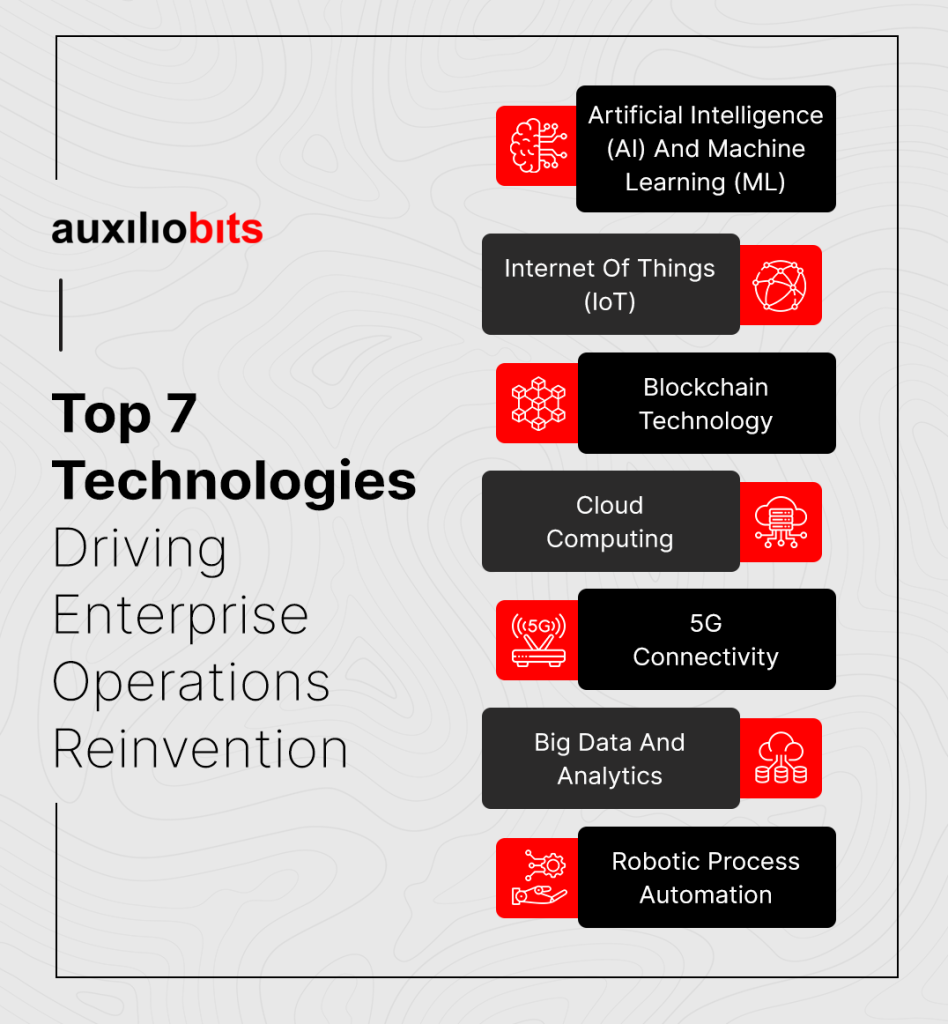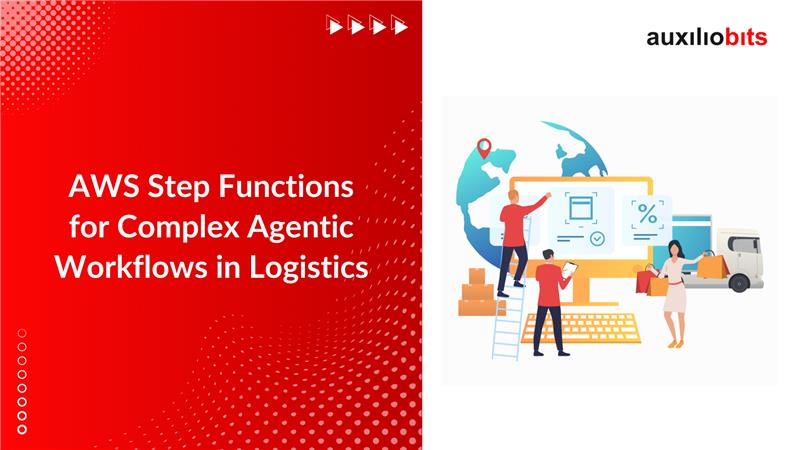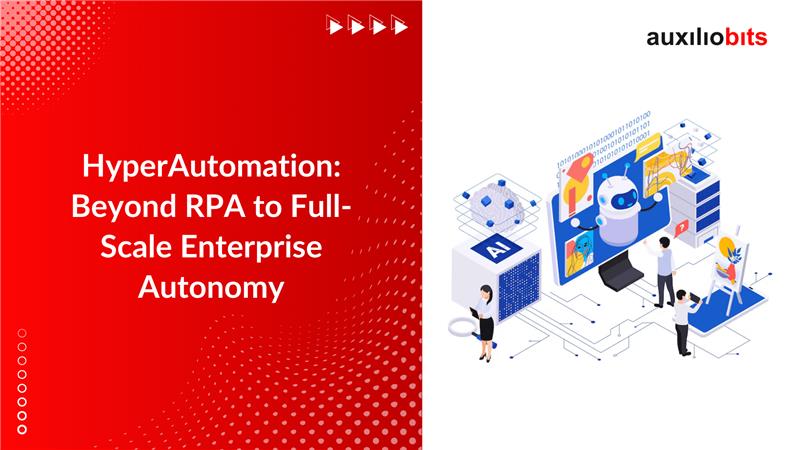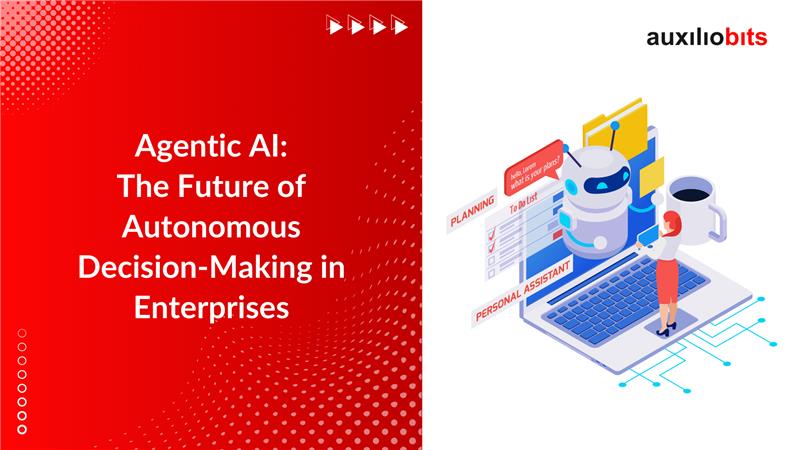
Key takeways
- Technology is the enabler of smarter decision-making, streamlined operations & customer-centric strategies.
- Artificial Intelligence and Machine Learning are some of the most important technologies when it comes to changing how businesses/organizations work differently.
- The Internet of Things (IoT) works like a group of connected devices & systems that transform how businesses operate, collect data & make decisions.
- Blockchain stands as a digital sentinel that reshapes how supply chains & financial operations are managed, secured & transparently tracked.
- Cloud computing liberates enterprises from the constraints of on-premises infrastructure, offering the flexibility to scale resources up or down as needed.
- 5G's empowers enterprises to connect and manage a multitude of devices and sensors in real time.
- Big Data analytics empowers enterprises to extract valuable insights from vast and diverse datasets. These insights drive informed decision-making, optimizing processes, and identifying growth opportunities.
- RPA empowers enterprises to automate repetitive and time-consuming tasks, freeing human resources for more value-added activities.
In a rapidly evolving business landscape, where change is the only constant, enterprises find themselves at a crossroads. They must not only adapt but reinvent themselves to thrive. The question that echoes through boardrooms & executive suites is – How can businesses not only survive but flourish in this era of disruption? The solution lies where innovation & technology meet.
Let’s learn about the top 7 technologies that are spearheading an extraordinary transformation in the domain of enterprise operations.
The Significance Of Technology In The Enterprise Sector
Technology is no longer a side player in the enterprise arena, it’s the driving force behind innovation & competitiveness. It’s the enabler of smarter decision-making, streamlined operations & customer-centric strategies. MGI Research estimates that global tech spending will grow from $8.51 trillion in 2022 to $11.47 trillion in 2026 which represents a 5-year CAGR of 7.75%. (Source: MGI Research). These figures underscore the indisputable significance of technology in today’s enterprise sector.
1. Artificial Intelligence (AI) And Machine Learning (ML)
Artificial Intelligence and Machine Learning are some of the most important technologies when it comes to changing how businesses/organizations work differently. These cutting-edge technologies are not just changing the game, they are actually rewriting the rules.
Transforming Enterprise Operations With AI And ML
The global AI market is projected to reach a staggering $190.61 billion by 2025, demonstrating its rapid ascent in reshaping business operations (Statista). AI & ML have emerged as veritable game-changers, automating processes, predicting trends & optimizing operations in ways previously unimaginable.
These technologies empower enterprises to analyze vast datasets, make data-driven decisions & automate routine tasks with extraordinary precision. They are the driving force behind chatbots that provide instant customer support, recommendation systems that personalize user experiences & predictive maintenance that reduces downtime.
(Source: Cision)
Key AI And ML Trends
More & more people and companies are putting money into AI, which means they’re using it more too. According to the research, 5 years ago, 40 out of 100 people at companies that used AI said they spent more than 5 out of every 100 dollars on AI. But now, more than half of them are doing that. And in the future, 63 out of 100 people say they’ll spend even more money on AI in the next three years. (Source: McKinsey)
Trends such as Explainable AI, Federated Learning, and AI in cybersecurity are gaining prominence. Explainable AI ensures transparency and trust in AI-driven decision-making, Federated Learning allows models to be trained across distributed data sources without centralizing data, and AI in cybersecurity fortifies defenses against evolving threats.

2. Internet Of Things (IoT)
The Internet of Things (IoT) works like a group of connected devices & systems that transform how businesses operate, collect data & make decisions.
Enhancing Operational Efficiency With IoT
IoT is the backbone of operational efficiency, allowing enterprises to collect & analyze real-time data from an array of sources. As per the latest research, there are approx. 15.14 billion IoT-connected devices. And, this figure is projected to reach 29.42 billion by 2030, underlining the exponential growth of IoT and its influence on the business landscape. (Source: Exploding Topics).Through IoT, businesses optimize processes, reduce downtime, and proactively maintain equipment.
For instance, sensors embedded in manufacturing machinery can monitor performance metrics, enabling predictive maintenance that prevents costly breakdowns and production delays. This newfound efficiency not only reduces costs but also enhances overall productivity.
IoT Security Considerations For American Businesses
As IoT adoption grows, so do security concerns. American businesses are increasingly aware of the importance of safeguarding IoT networks and devices. Based on the report by CISCO, cyberattacks on IoT devices increased by 300% in the USA, underscoring the urgent need for robust IoT security measures.
These attacks range from unauthorized access to data breaches and even control over connected devices. (Source: Cloud Tweaks)
American enterprises are now investing in comprehensive security protocols, including encryption, device authentication, and regular software updates, to fortify their IoT infrastructure.
3. Blockchain Technology
In the era of enterprise operations reinvention, Blockchain stands as a digital sentinel that reshapes how supply chains & financial operations are managed, secured & transparently tracked.
Blockchain's Impact On Supply Chain And Financial Operations
Blockchain’s distributed ledger technology is revolutionizing supply chains, offering an immutable and transparent ledger for tracking goods from production to delivery. 70% of surveyed supply chain professionals believe blockchain can increase supply chain transparency and can fundamentally change the way they engage with physical assets in the supply chain. (Source: Zipdo)
In financial operations, blockchain is driving innovation by enabling secure and nearly instantaneous cross-border transactions. Traditional financial systems often involve intermediaries, resulting in delays and additional costs. Blockchain streamlines these processes, reducing settlement times and improving cost efficiency.
Regulatory Challenges And Solutions For Blockchain Adoption
As with any transformative technology, blockchain adoption faces regulatory challenges. However, American companies are proactively addressing these challenges. The United States has been actively working on creating a regulatory framework for blockchain & cryptocurrencies, with multiple federal agencies, including the SEC and CFTC, involved in the process. These efforts demonstrate the commitment to fostering innovation while ensuring security & compliance.
Solutions such as smart contracts and privacy-focused blockchains are being explored to address regulatory concerns. Smart contracts automate and enforce the terms of an agreement, reducing the need for intermediaries, while privacy-focused blockchains allow for secure and private transactions, aligning with data protection regulations. (Source: Global Legal Insights)
4. Cloud Computing
The global cloud computing market is projected to reach $623.3 billion by 2023 which showcases the rapid adoption & growth of cloud technologies. (Source: Cision). Cloud computing liberates enterprises from the constraints of on-premises infrastructure, offering the flexibility to scale resources up or down as needed. This transition is not merely about adopting new technology, it’s about fundamentally altering the way businesses operate.
Whether it’s migrating data to the cloud or hosting applications, cloud adoption is the driving force behind modernization.
Benefits Of Cloud Adoption
- Scalability: The ability to scale resources on-demand is a game-changer. It means businesses don’t have to spend a lot of money on expensive hardware & machines that might become old & useless. They can seamlessly adjust computing power, storage, and networking resources to meet evolving needs.
- Cost Efficiency: Cloud computing shifts capital expenditures to operational expenditures. This cost-effective model eliminates the need for constant hardware upgrades and maintenance, resulting in substantial cost savings.
- Remote Collaboration: The cloud facilitates remote work by providing secure and accessible data and applications from anywhere. This proved indispensable during the global pandemic, enabling businesses to continue operations without disruption.
5. 5G Connectivity
As per the research, 5G network access was available in 503 cities in the United States i.e. more than anywhere else in the world. This means we’re entering a new time of super-fast & quick communication for businesses. 5G’s impact goes beyond smartphones. It empowers enterprises to connect and manage a multitude of devices and sensors in real time.
Imagine a manufacturing floor where machines communicate flawlessly, a healthcare ecosystem where telemedicine thrives, and an autonomous vehicle network that navigates with precision – all made possible by 5G. (Source: Statista)
Industry-specific Implications Of 5G
- Manufacturing: 5G-enabled smart factories are optimizing production processes through real-time monitoring and control, reducing downtime, and enhancing efficiency.
- Healthcare: Telemedicine powered by 5G is bringing healthcare services to remote areas, enabling real-time patient monitoring, and improving emergency response times.
- Transportation: In the transportation sector, 5G is paving the way for autonomous vehicles and efficient traffic management, reducing congestion and accidents.
- Entertainment: The gaming industry is benefiting from 5G’s low latency, enabling cloud gaming and immersive augmented reality experiences.
6. Big Data And Analytics
As per the reports, it was estimated that 44 zettabytes of data were generated globally, and this number is projected to grow exponentially, providing an ocean of information for businesses to navigate. (Source: Exploding Topics). The ability to harness Big Data is a game-changer in enterprise operations. Big Data analytics empowers enterprises to extract valuable insights from vast and diverse datasets. These insights drive informed decision-making, optimizing processes, and identifying growth opportunities. Process mining and communication mining help extract insights from multiple data sources that facilitate better decision making.
Whether it’s understanding customer preferences or predicting market trends, Big Data analytics is the compass that leads to competitive advantage.
7. Robotic Process Automation (RPA)
The global industrial automation market is projected to grow from USD 205.86 billion in 2022 to USD 395.09 billion by 2029, exhibiting a CAGR of 9.8 that reflects the widespread adoption of automation in various industries. (Source: Fortune Business Insights)
RPA is the linchpin of operational streamlining. It empowers enterprises to automate repetitive and time-consuming tasks, freeing human resources for more value-added activities. Whether it’s automating data entry, order processing, or even customer service through chatbots, automation enhances efficiency and reduces operational costs.
Conclusion
In the dynamic realm of enterprise operations, one thing remains constant: change. But in this era of technological metamorphosis, it’s not just change; it’s a seismic shift, driven by innovation and powered by cutting-edge technologies.
The path ahead is illuminated by data-driven insights, automation, security fortresses, and immersive experiences. The blueprint for success lies in your hands. So, are you ready to embark on this transformative journey, embracing the future with open arms and the spirit of innovation? The canvas is blank, the possibilities boundless, and the time is now. The future of enterprise operations is yours to reinvent.
If you want to reinvent your enterprise, we at Auxiliobits are happy to help! We have a professional team of experts who can support you in selecting and deploying the best software tools to enhance the efficiency of your existing systems. We provide cost-effective solutions that are customized according to the specific needs of your business.






